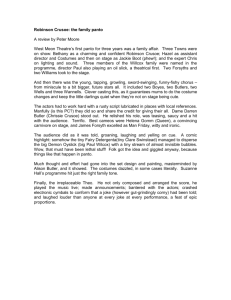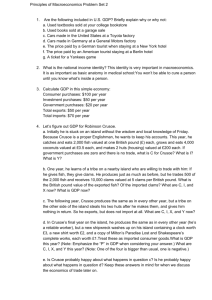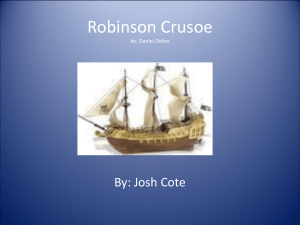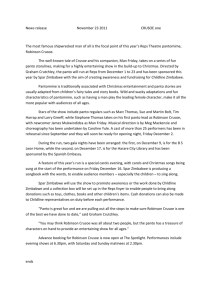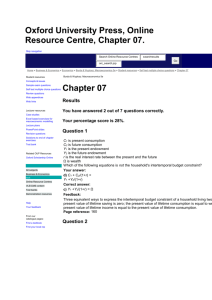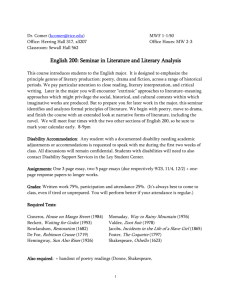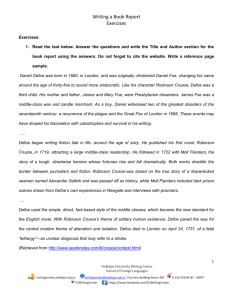Robinson Crusoe
advertisement
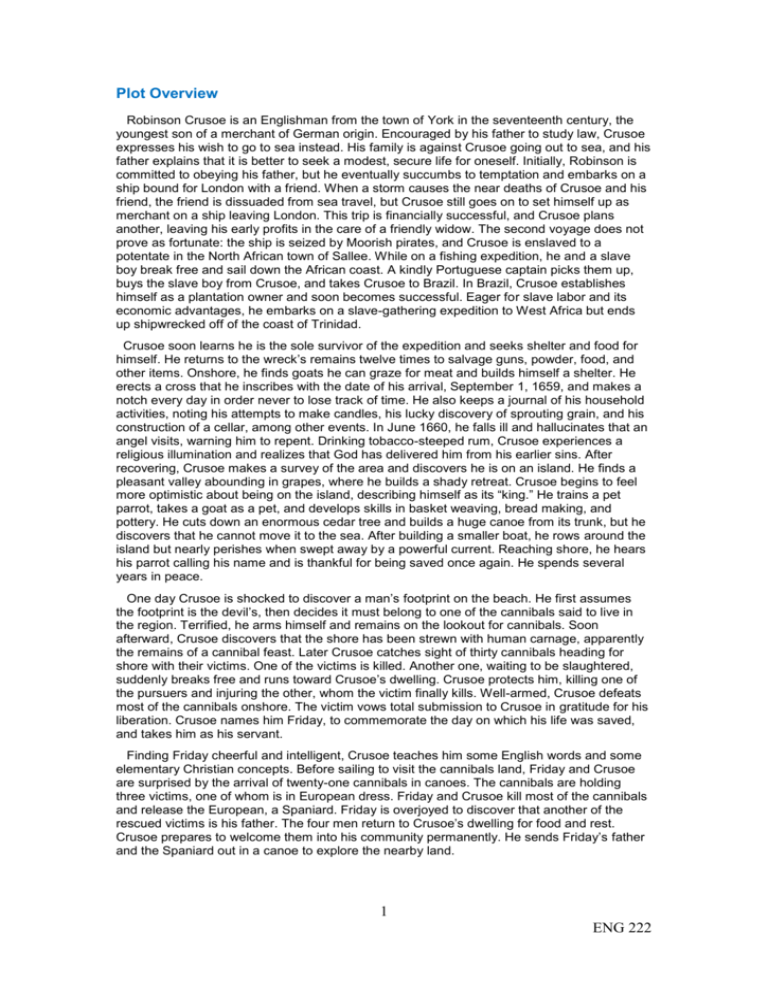
Plot Overview Robinson Crusoe is an Englishman from the town of York in the seventeenth century, the youngest son of a merchant of German origin. Encouraged by his father to study law, Crusoe expresses his wish to go to sea instead. His family is against Crusoe going out to sea, and his father explains that it is better to seek a modest, secure life for oneself. Initially, Robinson is committed to obeying his father, but he eventually succumbs to temptation and embarks on a ship bound for London with a friend. When a storm causes the near deaths of Crusoe and his friend, the friend is dissuaded from sea travel, but Crusoe still goes on to set himself up as merchant on a ship leaving London. This trip is financially successful, and Crusoe plans another, leaving his early profits in the care of a friendly widow. The second voyage does not prove as fortunate: the ship is seized by Moorish pirates, and Crusoe is enslaved to a potentate in the North African town of Sallee. While on a fishing expedition, he and a slave boy break free and sail down the African coast. A kindly Portuguese captain picks them up, buys the slave boy from Crusoe, and takes Crusoe to Brazil. In Brazil, Crusoe establishes himself as a plantation owner and soon becomes successful. Eager for slave labor and its economic advantages, he embarks on a slave-gathering expedition to West Africa but ends up shipwrecked off of the coast of Trinidad. Crusoe soon learns he is the sole survivor of the expedition and seeks shelter and food for himself. He returns to the wreck’s remains twelve times to salvage guns, powder, food, and other items. Onshore, he finds goats he can graze for meat and builds himself a shelter. He erects a cross that he inscribes with the date of his arrival, September 1, 1659, and makes a notch every day in order never to lose track of time. He also keeps a journal of his household activities, noting his attempts to make candles, his lucky discovery of sprouting grain, and his construction of a cellar, among other events. In June 1660, he falls ill and hallucinates that an angel visits, warning him to repent. Drinking tobacco-steeped rum, Crusoe experiences a religious illumination and realizes that God has delivered him from his earlier sins. After recovering, Crusoe makes a survey of the area and discovers he is on an island. He finds a pleasant valley abounding in grapes, where he builds a shady retreat. Crusoe begins to feel more optimistic about being on the island, describing himself as its “king.” He trains a pet parrot, takes a goat as a pet, and develops skills in basket weaving, bread making, and pottery. He cuts down an enormous cedar tree and builds a huge canoe from its trunk, but he discovers that he cannot move it to the sea. After building a smaller boat, he rows around the island but nearly perishes when swept away by a powerful current. Reaching shore, he hears his parrot calling his name and is thankful for being saved once again. He spends several years in peace. One day Crusoe is shocked to discover a man’s footprint on the beach. He first assumes the footprint is the devil’s, then decides it must belong to one of the cannibals said to live in the region. Terrified, he arms himself and remains on the lookout for cannibals. Soon afterward, Crusoe discovers that the shore has been strewn with human carnage, apparently the remains of a cannibal feast. Later Crusoe catches sight of thirty cannibals heading for shore with their victims. One of the victims is killed. Another one, waiting to be slaughtered, suddenly breaks free and runs toward Crusoe’s dwelling. Crusoe protects him, killing one of the pursuers and injuring the other, whom the victim finally kills. Well-armed, Crusoe defeats most of the cannibals onshore. The victim vows total submission to Crusoe in gratitude for his liberation. Crusoe names him Friday, to commemorate the day on which his life was saved, and takes him as his servant. Finding Friday cheerful and intelligent, Crusoe teaches him some English words and some elementary Christian concepts. Before sailing to visit the cannibals land, Friday and Crusoe are surprised by the arrival of twenty-one cannibals in canoes. The cannibals are holding three victims, one of whom is in European dress. Friday and Crusoe kill most of the cannibals and release the European, a Spaniard. Friday is overjoyed to discover that another of the rescued victims is his father. The four men return to Crusoe’s dwelling for food and rest. Crusoe prepares to welcome them into his community permanently. He sends Friday’s father and the Spaniard out in a canoe to explore the nearby land. 1 ENG 222 Eight days later, the sight of an approaching English ship alarms Friday. Crusoe and the ship's captain pretend that the island is an imperial territory and that the governor has spared their lives in order to send them all to England to face justice. On December 19, 1686, Crusoe boards the ship to return to England. There, he finds his family is deceased except for two sisters. His widow friend has kept Crusoe’s money safe, and after traveling to Lisbon, Crusoe learns from the Portuguese captain that his plantations in Brazil have been highly profitable. He arranges to sell his Brazilian lands. Finally arriving back in England, Crusoe receives word that the sale of his plantations has been completed and that he has made a considerable fortune.He marries, and his wife dies. Crusoe finally departs for the East Indies as a trader in 1694. He revisits his island, finding that the Spaniards are governing it well and that it has become a prosperous colony. Robinson Crusoe Crusoe's perseverance and resourcefulness in building a home, dairy, grape arbor, country house, and goat stable from practically nothing is clearly remarkable. Crusoe’s business instincts are just as considerable as his survival instincts: he manages to make a fortune in Brazil despite a twenty-eight-year absence and even leaves his island with a nice collection of gold. Moreover, Crusoe is never interested in portraying himself as a hero in his own narration. He does not boast of his courage in quelling the mutiny, and he is always ready to admit unheroic feelings of fear or panic, as when he finds the footprint on the beach. Crusoe prefers to depict himself as an ordinary sensible man, never as an exceptional hero. But Crusoe’s admirable qualities must be weighed against the flaws in his character. Crusoe seems incapable of deep feelings, as shown by his cold account of leaving his family—he worries about the religious consequences of disobeying his father, but never displays any emotion about leaving. When Crusoe tells us that he has gotten married and that his wife has died all within the same sentence, his indifference to her seems almost cruel. Finally, while not boasting of heroism, Crusoe is nonetheless very interested in possessions, power, and prestige. When he first calls himself king of the island it seems jocund, but when he describes the Spaniard as his subject we must take his royal delusion seriously, since it seems he really does consider himself king. His teaching Friday to call him “Master,” even before teaching him the words for “yes” or “no,” seems obnoxious even under the racist standards of the day, as if Crusoe needs to hear the ego-boosting word spoken as soon as possible. Overall, Crusoe’s virtues tend to be private: his industry, resourcefulness, and solitary courage make him an exemplary individual. But his vices are social, and his urge to subjugate others is highly objectionable. In bringing both sides together into one complex character, Defoe gives us a fascinating glimpse into the successes, failures, and contradictions of modern man. Friday If Crusoe represents the first colonial mind in fiction, then Friday represents not just a Caribbean tribesman, but all the natives of America, Asia, and Africa who would later be oppressed in the age of European imperialism. At the moment when Crusoe teaches Friday to call him “Master” Friday becomes an enduring political symbol of racial injustice in a modern world critical of imperialist expansion. Recent rewritings of the Crusoe story, like J. M. Coetzee’s Foe and Michel Tournier’s Friday, emphasize the sad consequences of Crusoe’s failure to understand Friday and suggest how the tale might be told very differently from the native’s perspective. Indeed, Defoe at times underscores the contrast between Crusoe’s and Friday’s personalities, as when Friday, in his joyful reunion with his father, exhibits far more emotion toward his family than Crusoe. Whereas Crusoe never mentions missing his family or dreams about the happiness of seeing them again, Friday jumps and sings for joy when he meets his father, and this emotional display makes us see what is missing from Crusoe’s stodgy heart. Friday’s expression of loyalty in asking Crusoe to kill him rather than leave him is more heartfelt than anything Crusoe ever says or does. In short, Friday’s exuberance and emotional directness often point out the wooden conventionality of Crusoe’s personality. 2 ENG 222 Despite Friday’s subjugation, however, Crusoe appreciates Friday much more than he would a mere servant. Crusoe does not seem to value intimacy with humans much, but he does say that he loves Friday, which is a remarkable disclosure. It is the only time Crusoe makes such an admission in the novel, since he never expresses love for his parents, brothers, sisters, or even his wife. The mere fact that an Englishman confesses more love for an illiterate Caribbean ex-cannibal than for his own family suggests the appeal of Friday’s personality. Crusoe may bring Friday Christianity and clothing, but Friday brings Crusoe emotional warmth and a vitality of spirit that Crusoe’s own European heart lacks. Themes, Motifs & Symbols Themes Themes are the fundamental and often universal ideas explored in a literary work. The Ambivalence of Mastery Crusoe’s success in mastering his situation, overcoming his obstacles, and controlling his environment shows the condition of mastery in a positive light, at least at the beginning of the novel. Crusoe lands in an inhospitable environment and makes it his home. His taming and domestication of wild goats and parrots with Crusoe as their master illustrates his newfound control. Moreover, Crusoe’s mastery over nature makes him a master of his fate and of himself. Early in the novel, he frequently blames himself for disobeying his father’s advice or blames the destiny that drove him to sea. But in the later part of the novel, Crusoe stops viewing himself as a passive victim and strikes a new note of self-determination. In building a home for himself on the island, he finds that he is master of his life—he suffers a hard fate and still finds prosperity. But this theme of mastery becomes more complex and less positive after Friday’s arrival, when the idea of mastery comes to apply more to unfair relationships between humans. In Chapter XXIII, Crusoe teaches Friday the word “[m]aster” even before teaching him“yes” and “no,” and indeed he lets him “know that was to be [Crusoe’s] name.” Crusoe never entertains the idea of considering Friday a friend or equal—for some reason, superiority comes instinctively to him. We further question Crusoe’s right to be called “[m]aster”when he later refers to himself as “king” over the natives and Europeans, who are his “subjects.” The Necessity of Repentance Crusoe’s experiences constitute not simply an adventure story in which thrilling things happen, but also a moral tale illustrating the right and wrong ways to live one’s life. This moral and religious dimension of the tale is indicated in the Preface, which states that Crusoe’s story is being published to instruct others in God’s wisdom, and one vital part of this wisdom is the importance of repenting one’s sins. While it is important to be grateful for God’s miracles, as Crusoe is when his grain sprouts, it is not enough simply to express gratitude or even to pray to God, as Crusoe does several times with few results. Crusoe needs repentance most, as he learns from the fiery angelic figure that comes to him during a feverish hallucination and says, “Seeing all these things have not brought thee to repentance, now thou shalt die.” Crusoe believes that his major sin is his rebellious behavior toward his father, which he refers to as his “original sin,” akin to Adam and Eve’s first disobedience of God. This biblical reference also suggests that Crusoe’s exile from civilization represents Adam and Eve’s expulsion from Eden. For Crusoe, repentance consists of acknowledging his wretchedness and his absolute dependence on the Lord. This admission marks a turning point in Crusoe’s spiritual consciousness, and is almost a born-again experience for him. After repentance, he complains much less about his sad fate and views the island more positively. References SparkNotes Editors. (2003). SparkNote on Robinson Crusoe. Retrieved February 13, 2013, from http://www.sparknotes.com/lit/crusoe/ 3 ENG 222
